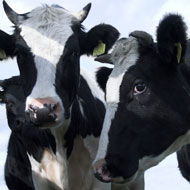Cows use individual calls to communicate

The study confirms the theory that cows use individualised calls to communicate with each other.
Researchers from the University of Nottingham and the Queen Mary University of London have been measuring the process of how cows communicate using detailed acoustic analysis for the first time.
The team spent ten months studying the ways cows communicate with their young, carefully examining acoustic indicators of identity and age.
Two distinct maternal 'calls' were identified. When cows were close to their calves, they communicated with them using low frequency calls. When the cows were separated, their calls were louder and were at a much higher frequency.
A third call, used by calves to call out to their mothers when they wanted to start suckling, was also identified.
The researchers say that this study confirms the theory that cows use individualised calls to communicate with each other.
Two herds of free-range cattle from a farm in Nottinghamshire were used in the study. Highly sensitive equipment was used to make the recordings, which gathered so much data it took another year to analyse.
Dr Monica Padilla de la Torre, from the University of Nottingham, said: “The research shows for the first time that mother-offspring cattle ‘calls’ are individualised— each calf and cow have a characteristic and exclusive call of their own. Acoustic analysis also reveals that certain information is conveyed within the calf calls — age, but not gender.”
The researchers say that the results provide an excellent foundation of investigating vocal indicators of cattle welfare.
Dr Alan McElligott, at Queen Mary University of London, said: "By investigating vocalisations in behavioural contexts outside of mother-offspring communication, further research could reveal vocal indicators of welfare — and influence change in animal care policies.”
The paper, Acoustic analysis of cattle (Bos taurus) mother-offspring contact calls from a source-filter theory perspective, is published in Applied Animal Behaviour Science.



 The Animal and Plant Health Agency (APHA) has updated its online reporting service for dead wild birds.
The Animal and Plant Health Agency (APHA) has updated its online reporting service for dead wild birds.